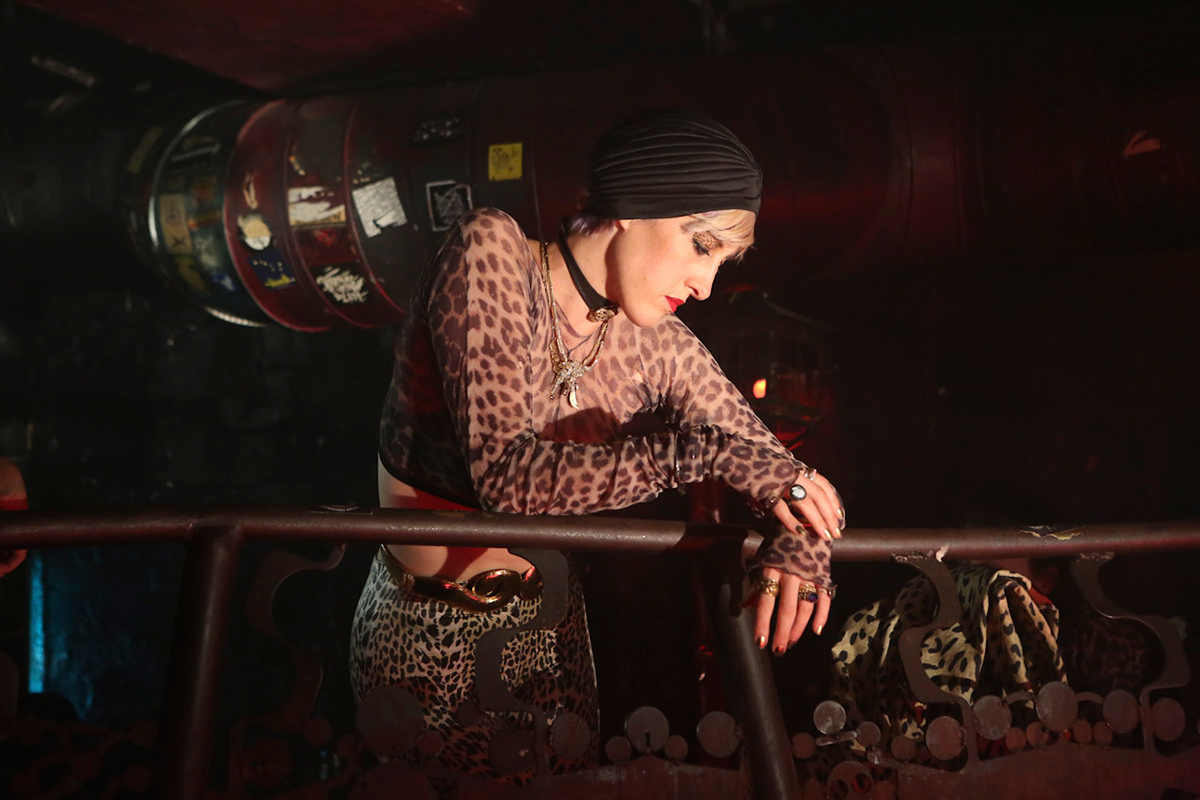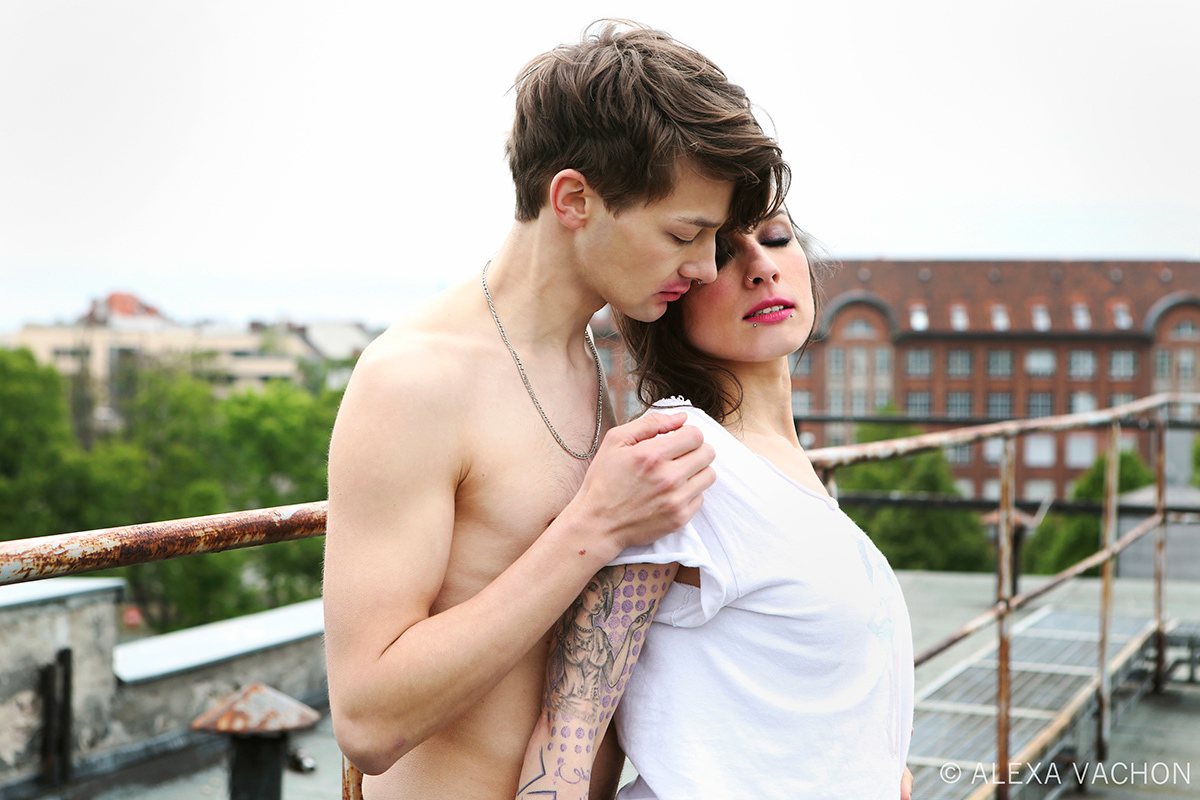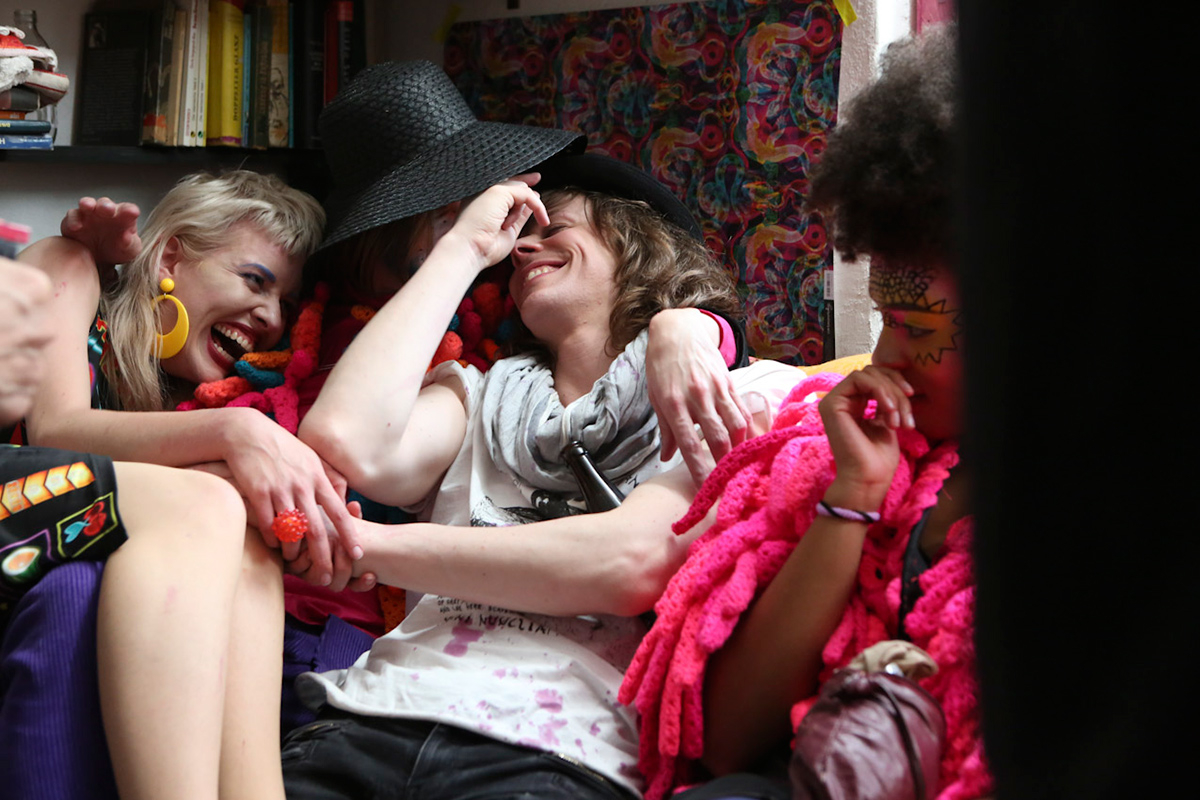Yony Leyser’s second film, Desire Will Set You Free, presents contemporary Berlin as a queer playground of debauched house parties and clubs, with cameos from cult icons (like Nina Hagen and Blixa Bargeld). A softer version of John Cameron Mitchell’s Shortbus with a sparkly, synth-y soundtrack featuring Peaches and Blood Orange, Desire is the story of a privileged American writer from a Palestinian-Israeli background who meets a naive Russian prostitute. Shot in and around Berlin’s classic nightlife haunts, like Berghain, Roses, and Ficken 3000, and cast mostly with real people playing themselves, it sometimes feels like a documentary.
This month Desire will be the centerpiece of the San Francisco Independent Film Festival, it will screen in Brooklyn, and it will be released from coast to coast on home video. Leyser’s next film (a documentary about the history of gay punk with Kathleen Hanna and John Waters) is in post-production.
We sit down at the back of a Kreuzberg bar to talk about Desire, his new film, and Berlin.
What inspired Desire?
I visited the city after finishing a documentary about William Burroughs in 2007, and it felt like Christopher Isherwood’s Weimar Berlin – a resurgent oasis of subculture. I wanted to document that but wasn’t sure how.
Later, when I was living here in 2012 and reading Daniel Pinchbeck, I decided it was going to be the end of the world on December 21. I was flirting online for months with this guy who lived in rural Latvia and had never left the country. He said, ‘Before the end of the world I’m coming to Berlin.’ He came two weeks before it was set to end and we went out and he met queer people and trans people for the first time and was almost shell-shocked, quietly drawing in his journals. Right before the world was supposed to end, she came out as a woman. We talked about everything she’d seen and that was the impetus: to show queer, campy Berlin through her eyes.
Berlin has been a queer haven with people like Isherwood immigrating here since the 30s, and yet same-sex marriage is not legal in Germany.
I have a lot of activist friends whose work is more representative of helping society as a whole and it’s interesting, but I’m much more into the world that’s not so exposed. Most of my queer heroes were against any kind of marriage.

What would Isherwood think now? Are today’s parties more or less decadent than Weimar Berlin?
His stories, like mine, are a lot of fiction – I love to fantasize and exaggerate – but today it’s much more widespread, so it’s probably more fun now.
In Berlin, it’s not uncommon to see people having sex around the dancefloor or in other public corners of a club. In a film about queer Berlin nightlife, Desire wasn’t nearly as explicit as it could be.
I know. If I would do it again, it would be more so.
You disrupt the patriarchal three-way imaginary when your lead female character takes home two guys. Although she’s in an open relationship, it’s not going well and sex is relegated to her cramped bathroom. When there are so few films today which portray openly non-monogamous relationships in a positive light, why did you choose to show one that’s not working?
It’s not an intentional critique of poly relationships. After time, very few relationships work out. And in the end, she’s still polyamorous.
The soundtrack is awesome. What’s on there?
It’s all Berlin bands or international bands covering older Berlin songs. Peaches covers a 1920s lesbian cabaret singer, and Dev Hynes and Samantha Urbani cover Malaria!, an all-girl lesbian punk band from the 80s. The vinyl will be out soon.

Some have criticized you for not casting a trans person to play the role of Sasha.
We tried trans actors for that role, but the truth is that for 80% of the film, Sasha is a guy and he has to be naked. There weren’t any trans women who wanted to do that.
There’s a scene where people in various states of undress are covered in glitter confetti at a picnic. Tell me about that.
Labanna Babalon was doing this internet sex art thing, so I said, “We’re shooting at Gorlitzer Park, bring whatever props you want”. There were two young Russians staring from a bench, so we said, “Go to them!”. It was fun.
Who made the colorful house party costumes?
A local artist from Australia called Anto Christ crochets these amazing soft sculpture outfits. She’s like Leigh Bowery, always going out in her designs and crazy make-up. If she lived in Paris, London, or LA she’d have huge shows. Here, she’s relatively unknown. Other clothes were made by fashion designer Tata Christiane.
Tell me about your film-in-progress.
It’s a documentary about queer-core, a fictional gay punk farce started by Bruce LaBruce and G. B. Jones. They were frustrated by the prevailing bourgeois gay culture and felt unaccepted by punks so they made zines claiming a huge gay punk scene in Toronto. This was pre-internet, so the zines spread, people believed it, and bands sprung up. All this from just three people. I love the idea of creating a secret society in your bedroom.
Desire Will Set You Free will screen at the Roxie Theater in San Francisco on February 12th and 13th and the Spectacle in Brooklyn from February 24th – 26th.
Credits
Text Mary Katharine Tramontana
All images courtesy Missing Films
